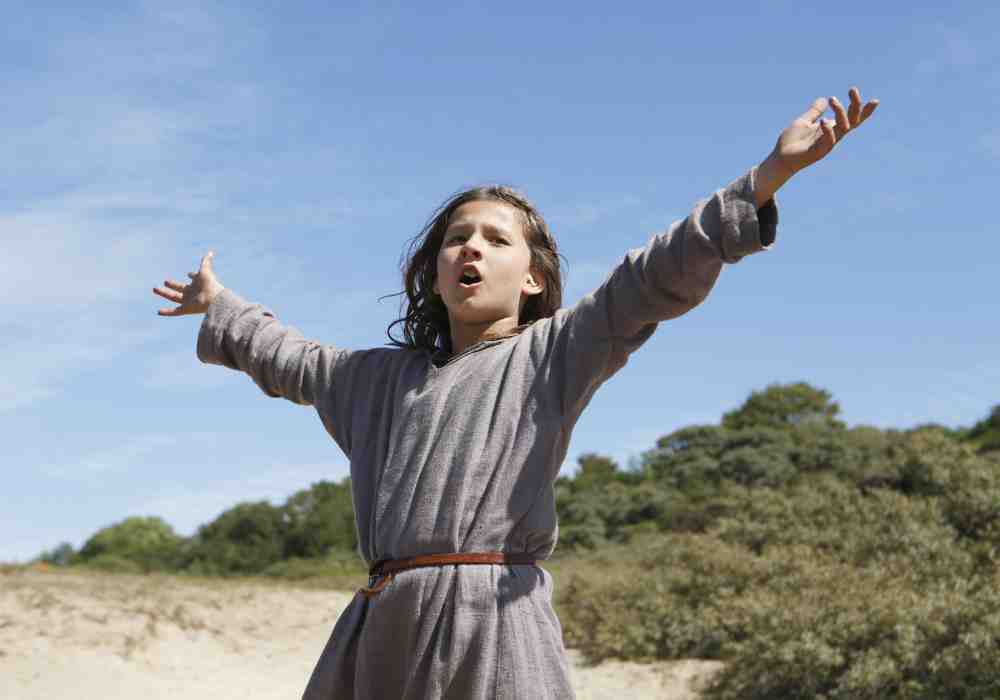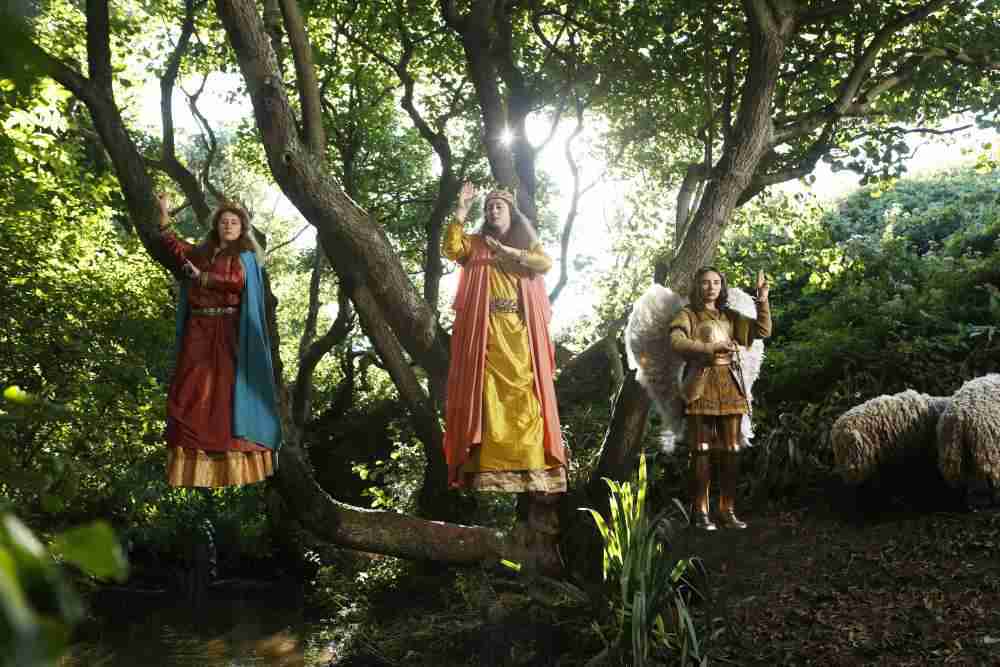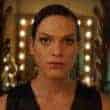Bruno Dumont discusses the making of his Joan of Arc metal musical, Jeannette: The Childhood of Joan of Arc, achieving the film’s oddball comedy, and his aversion to cinematic moralising.

French director Bruno Dumont started his career 20 years ago making shockingly violent art house films, but switched to comedy and slapstick in 2014 with P’tit Quinquin. An unclassifiable, at times disturbing story of cannibalism in a quirky seaside French town, P’tit Quinquin was shown on French television as a four-part mini-series and released elsewhere as a condensed feature. Dumont had almost finished shooting Coin Coin, the follow-up to this odd project, when I interviewed him by phone last September to talk about his latest oddball comedy of sorts, Jeannette: The Childhood of Joan of Arc.
Dumont’s fascination with singular faces and seaside settings have become his trademark since P’tit Quinquin; they are beautifully employed here. The film’s novelty is all in its unique, bonkers execution: rather than being a straightforward biopic about Joan of Arc as a child, Jeannette is a sung-through metal musical (you read that right). The meandering prose of the lyrics, the fact that most of the cast can’t really sing, the flying angels… make Jeannette a wildly funny experiment. Faced with such a joyous, unapologetically random amalgam, the film toys with the fine line between the ridiculous and the sublime.
This interview was conducted in French, then translated to English.
Seventh Row (7R): How did you first get the idea to make a film about Joan of Arc?
Bruno Dumont: I was looking for a topic to make a musical about, but I didn’t want to write a story from scratch. I was interested in the story of Joan of Arc. I had read Charles Peguy’s medieval drama Le mystère de la charité de Jeanne d’Arc. At the same time, I was aware that while some parts of Joan of Arc’s story have been told countless times — most of all, her trial — others are not well-known at all. So my interest in her childhood was a little contradictory, counterintuitive, and original, in the context of a larger story that is much less original — in fact, it’s famous to the point of being a myth. That seemed interesting to me, and the musical was also a novel way to treat that topic.
[clickToTweet tweet=”‘The metal music, the amateur singing, the little girls — I wanted to create a fusion with all these disparate ingredients, so that the sophisticated source text would appear livelier.'” quote=”‘The metal music, the amateur singing, the little girls — I wanted to create a fusion with all these disparate ingredients, so that the sophisticated source text would appear livelier.'”]
7R: I feel like your earlier films were closer to a realist style. Why this move towards a more artificial aesthetic? Is the musical aspect of Jeannette: The Childhood of Joan of Arc part of that, too?
Bruno Dumont: Absolutely. The musical approach functions like the burlesque humour in the film: it’s using a path that runs a little parallel to reality, to psychology and to naturalism, and which allows for a transfiguration of the real. In a musical, you make characters sing to express themselves. They talk about reality but not via the paths of reality; not via speech or natural psychology, but instead through songs that tell a story.
[clickToTweet tweet=”‘In JEANNETTE, we’re in the world of wonder and fairytale.'” quote=”‘In JEANNETTE, we’re in the world of wonder and fairytale.'”]
I don’t think the [earlier films] were realist, actually. I think they enacted a false realism. There was indeed a strong feeling of naturalism, which probably came both from the performances and from the topics of the films. But I’ve always said that The Life of Jesus had nothing to do with the real; it was an extra-natural way to talk about reality.
I’m not a naturalist at all. If I sometimes go through the real, it’s because one has to go through something and to choose a path, to eventually talk about things that are much more hidden. It’s still the same today: what interests me is to represent what we are inside, rather than outside.
[clickToTweet tweet=”‘In a society that is so oppressed into being principled and right-minded, it interests me to go into the grey areas, a little outside morality.'” quote=”‘In a society that is so oppressed into being principled and right-minded, it interests me to go into the grey areas, a little outside morality.'”]
7R: There are compositions in Jeannette: The Childhood of Joan of Arc that are very painterly or which look like filmed theatre: the background remains the same, and the characters are all spread out in front of it, moving within a static frame. But within those compositions, you have actors who immediately give a sense of realism and naturalism.
Bruno Dumont: The source material is a play, and my film is an adaptation of the first part of the play, which focuses on Joan of Arc’s childhood. I follow word for word what Peguy writes, and it is quite theatrical.
But there is also this desire, like when you’re cooking, to put different ingredients together and to create a fusion. I really believe in mixing things together. In juxtaposing a text by Peguy — who is quite a sophisticated author — with metal music, amateur singing, and little girls, I wanted to create a fusion between all these disparate ingredients, which would make Peguy’s text livelier.
[clickToTweet tweet=”‘I can address tragedy in a profound way, but I always counter-balance it with humour. I think it’s a form of irony.'” quote=”‘I can address tragedy in a profound way, but I always counter-balance it with humour. I think it’s a form of irony.'”]
7R: This idea of fusion reminds me of all the morbid aspects of P’tit Quinquin and Slack Bay. In most of your previous films, you included elements that were very disturbing, sad, or morbid. But not in Jeannette.
Bruno Dumont: With the story of Joan of Arc, we’re more into grace and the ethereal. So, apart from the misery she talks about herself, I don’t push that aspect of the story too much — I simply represented the poverty she talks about with two hungry kids. There is indeed a purification of the real, which means I didn’t represent the aspects of the story that are more “trashy” [said in English during the interview].
At the same time, in P’tit Quinquin, the “trash” is undermined and neutralised by the burlesque humour, so much so that it isn’t “trash” in the end. There is this desire to neutralise what we fear. For example, the racism in P’tit Quinquin is very quickly neutralised by the burlesque humour. This process of neutralisation allows me to go far into transgressions.
In Jeannette, we’re in the world of wonder and fairytale. She says some things about “France to the French!” which are borderline nationalist and racist, but I think that’s fine, because these declarations are covered with a coating of burlesque and fairytale. In a society that is so oppressed into being principled and right-minded, it interests me to go into the grey areas, a little outside morality.
[clickToTweet tweet=”‘What is good, what is evil — I know the difference, and I don’t want to make moral films to tell people what it is. What I want to do is show human nature as it is.'” quote=”‘What is good, what is evil — I know the difference, and I don’t want to make moral films to tell people what it is. What I want to do is show human nature as it is.'”]
7R: In your earlier films, you didn’t seem to try to neutralise the horror: it was all there and in our faces.
Bruno Dumont: Exactly. But now, I neutralise it! In my more recent films, there is much more of a balance when it comes to human nature, the vicissitudes of our existence, the coexistence of the dark and the bright. Comedy allows me to give a much more balanced vision of things. I can address tragedy in a profound way, but I always counter-balance it with humour. I think it’s a form of irony. Even in the film I’m making now, I’m talking about very serious things, but I neutralise that heaviness and seriousness very quickly. I don’t want to make hefty political reflections. This isn’t where things are taking place, for me. I try to stay in the pre-language stage, before words and labels such as ‘moral’ and ‘amoral’, ‘good’ and ‘bad’.
What is good, what is evil — I know the difference, and I don’t want to make moral films to tell people what it is. What I want to do is show human nature as it is. And there lies the irony and the humour. I think it’s better to laugh about it than to cry.

7R: This question of good and evil — is it tied to your interest in religion, which we can see in almost all your films?
Bruno Dumont: I think my interest in religion comes from philosophy. When I deal with religion in my films, it’s in an effort to bring religion back to poetry. I’m not a religious person, but I think the power of religion lies in poetry. I really like seeing angels in trees, people flying, etc, because I think that’s the true poetic reality of things, and I don’t think it necessarily belongs to religion. In a way, religion stole poetry from us.
At the cinema, I can believe in God without any trouble. But when I leave, it’s over. It’s a special spiritual phenomenon, and I think our spiritual life can blossom in the arts and in the cinema. At the cinema, we believe that what we see is real, but at the same time, we don’t. We know that what we’re watching is just cinema, but we still believe in it, on a certain level. The same thing goes with God: you must believe in Him, and not believe in Him at the same time.
[clickToTweet tweet=”‘At the cinema, I can believe in God without any trouble. But when I leave, it’s over.'” quote=”‘At the cinema, I can believe in God without any trouble. But when I leave, it’s over.'”]
7R: You mention your interest in poetry and the marvellous. Does it explain why your more recent films often star children?
Bruno Dumont: Children allow me to go back to the beginning, where everything starts. Peguy says we all remain 12-year-old children, and I absolutely believe that. We can feel our bodies growing old, but our little hearts stay the same as they were when we were 12. When we complain about getting old, it’s because our hearts are staying the same — if our bodies and our hearts grew old together, we wouldn’t hurt and we wouldn’t complain. I think we stay children, and maybe in making film after film about children, it’s a movement towards what is essential, and what is essential is childhood. Because in childhood, everything is already there.
[clickToTweet tweet=”‘Charles Peguy says we all remain 12-year-old children, and I absolutely believe that. We can feel our bodies growing old, but our little hearts stay the same as they were when we were 12.'” quote=”‘Charles Peguy says we all remain 12-year-old children, and I absolutely believe that. We can feel our bodies growing old, but our little hearts stay the same as they were when we were 12.'”]
7R: You were talking about irony. It makes me think of the way you represent the emotions of your characters in the film. They’re always rather theatrical, exaggerated, and funny.
Bruno Dumont: Yes, they’re attractions. I wanted to show that the ridicule is the beginning of the sublime. To me, everything is joined and linked together. Good is joined to evil. When you touch good, you touch evil. In Jeannette, we’re at the limit of the ridiculous, and that’s where you find grace. The roots of grace are to be found in the burlesque, in my opinion. I think there is a general fusion of the opposites. Some of my characters evolve in a comic register, but they’re not devoid of grace: they’re not ridiculous in the sense that they have no value. They keep their value. I’m really interested in playing with the opposites in each character. And you can only really do it at the cinema. Otherwise, it’s through intellectual conversations that are absolutely unbearable!
For example, when you’re looking for love, you’re not far from hate. The two opposite ideas are in the same waters. That’s why I like to ask the actor to play like the love story of his character is a story of hate. When you ask the actor to play the opposite of what he would naturally do, you get something rather strange, but which still ultimately expresses the profound nature of that sentiment — a sentiment torn on each side by two opposite impulses.
[clickToTweet tweet=”‘Some of my characters evolve in a comic register, but they’re not devoid of grace: they’re not ridiculous in the sense that they have no value.'” quote=”‘Some of my characters evolve in a comic register, but they’re not devoid of grace: they’re not ridiculous in the sense that they have no value.'”]
7R: You were saying that dealing with opposites in this way via conversation would be too complicated and lead to nothing much. So how do you write a film like Jeannette?
Bruno Dumont: I prepare. Once in a while, I will have a scene with specific intentions, and in that scene, I will add actors that I won’t necessarily put forward, but who will make the scene explode. The scene becomes a sort of explosion of the text: it says something, but it also does exactly the opposite. In the film I’m making now, I really like the actor who plays the commanding officer, because he always does the opposite of what I ask him to do. It creates something rather staggering, because he says what is written, but he plays it in a totally novel way. He’s never redundant.
[clickToTweet tweet=”‘In the film I’m making now, I really like the actor who plays the commanding officer, because he always does the opposite of what I ask him to do.'” quote=”‘In the film I’m making now, I really like the actor who plays the commanding officer, because he always does the opposite of what I ask him to do.'”]
I write the script, but because I’m also in charge of the production, I can decide to shoot it all backwards and start with the ending — and that creates a very interesting result. What I don’t like is to shoot redundant films. I’m not interested in an actor who will just play what is written. So I will look for a disruptive element, something contradictory.
Unfortunately, we obviously can’t just go on an adventure and shoot. We have to put the camera somewhere, give a costume to the actor, etc… There are so many directives in our work, so I must absolutely find contradictory and random elements that will send everything in a different direction and create the comedy. On Camille Claudel 1915, I realised that when she slips on a banana peel, it’s even funnier because the person slipping is Camille Claudel. That’s what it is. Finding disrupting elements that will enrich the film.

